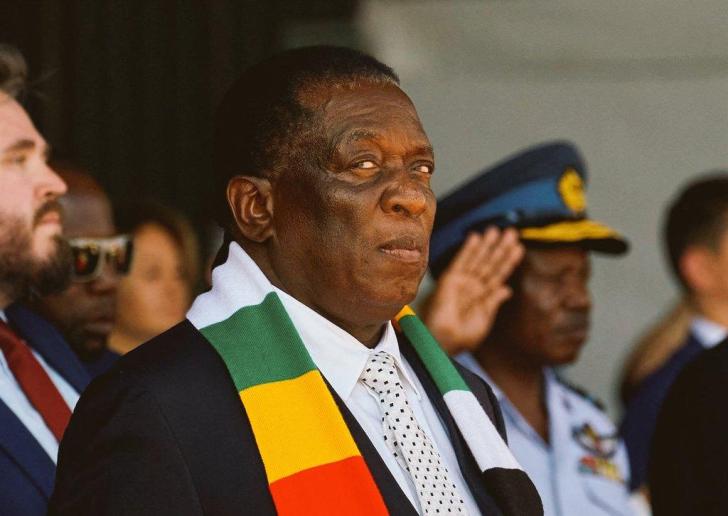News / National
Reasons why Mnangagwa wants term extension in power
11 Sep 2024 at 10:58hrs |
0 Views

President Emmerson Mnangagwa, who has been entrenched in Zimbabwean politics since 1980 and has held the presidency since November 2017, is determined to extend his rule beyond the 2028 constitutional limit for several reasons.
Desire for Longevity and Power
Sources close to Mnangagwa reveal that his desire to remain in power is driven by a longing for longevity, reminiscent of his mentor, the late Robert Mugabe, who ruled Zimbabwe for 37 years. Mnangagwa's prolonged tenure is partly a reflection of his deep-rooted connection to Mugabe's legacy.
Trappings of Power
Mnangagwa's long-standing tenure in government has made him accustomed to the privileges and power associated with high office. He is the only surviving minister from the early days of Zimbabwe's independence and has held various key positions, including Minister of State Security, Minister of Justice, Speaker of Parliament, and Vice-President. His extensive experience and entrenched role in politics have contributed to his reluctance to relinquish power.
Benefits of Office
Another significant factor driving Mnangagwa's ambition to stay longer is the extensive benefits he enjoys as President. This includes substantial perks, tight security, and unfettered access to government resources. Mnangagwa also benefits from lucrative government tenders, as evidenced by a leaked audio recording involving businessman Wicknell Chivayo, which highlighted the preferential access to tenders Mnangagwa's associates enjoy.
Human Rights Concerns
Mnangagwa's possible fear of retribution for alleged past transgressions also plays a role. His involvement in the Gukurahundi massacres, the violent 2008 election re-run, and the 2018 Harare protests, along with other human rights abuses, could be motivating his desire to retain power.
Fear of Corruption Allegations
Since ascending to power, Mnangagwa has been linked to numerous controversial deals and allegations of corruption. The "Gold Mafia" investigative documentary by Al Jazeera implicated Mnangagwa and his associates in gold smuggling and other illicit activities. These allegations, combined with questionable business deals, may be contributing to his desire to maintain his position to avoid potential repercussions.
Military Relations
Mnangagwa's relationship with the military has also been strained since the 2017 coup that brought him to power. His failure to fully meet promises made to the military, coupled with a deteriorating relationship, may contribute to his apprehension about leaving office and facing possible military reprisals.
In summary, Mnangagwa's determination to extend his presidency beyond the 2028 limit is driven by his attachment to power, the benefits he enjoys, concerns over past actions, and strained military relations.
Desire for Longevity and Power
Sources close to Mnangagwa reveal that his desire to remain in power is driven by a longing for longevity, reminiscent of his mentor, the late Robert Mugabe, who ruled Zimbabwe for 37 years. Mnangagwa's prolonged tenure is partly a reflection of his deep-rooted connection to Mugabe's legacy.
Trappings of Power
Mnangagwa's long-standing tenure in government has made him accustomed to the privileges and power associated with high office. He is the only surviving minister from the early days of Zimbabwe's independence and has held various key positions, including Minister of State Security, Minister of Justice, Speaker of Parliament, and Vice-President. His extensive experience and entrenched role in politics have contributed to his reluctance to relinquish power.
Benefits of Office
Another significant factor driving Mnangagwa's ambition to stay longer is the extensive benefits he enjoys as President. This includes substantial perks, tight security, and unfettered access to government resources. Mnangagwa also benefits from lucrative government tenders, as evidenced by a leaked audio recording involving businessman Wicknell Chivayo, which highlighted the preferential access to tenders Mnangagwa's associates enjoy.
Mnangagwa's possible fear of retribution for alleged past transgressions also plays a role. His involvement in the Gukurahundi massacres, the violent 2008 election re-run, and the 2018 Harare protests, along with other human rights abuses, could be motivating his desire to retain power.
Fear of Corruption Allegations
Since ascending to power, Mnangagwa has been linked to numerous controversial deals and allegations of corruption. The "Gold Mafia" investigative documentary by Al Jazeera implicated Mnangagwa and his associates in gold smuggling and other illicit activities. These allegations, combined with questionable business deals, may be contributing to his desire to maintain his position to avoid potential repercussions.
Military Relations
Mnangagwa's relationship with the military has also been strained since the 2017 coup that brought him to power. His failure to fully meet promises made to the military, coupled with a deteriorating relationship, may contribute to his apprehension about leaving office and facing possible military reprisals.
In summary, Mnangagwa's determination to extend his presidency beyond the 2028 limit is driven by his attachment to power, the benefits he enjoys, concerns over past actions, and strained military relations.
Source - newshawks
Join the discussion
Loading comments…









































